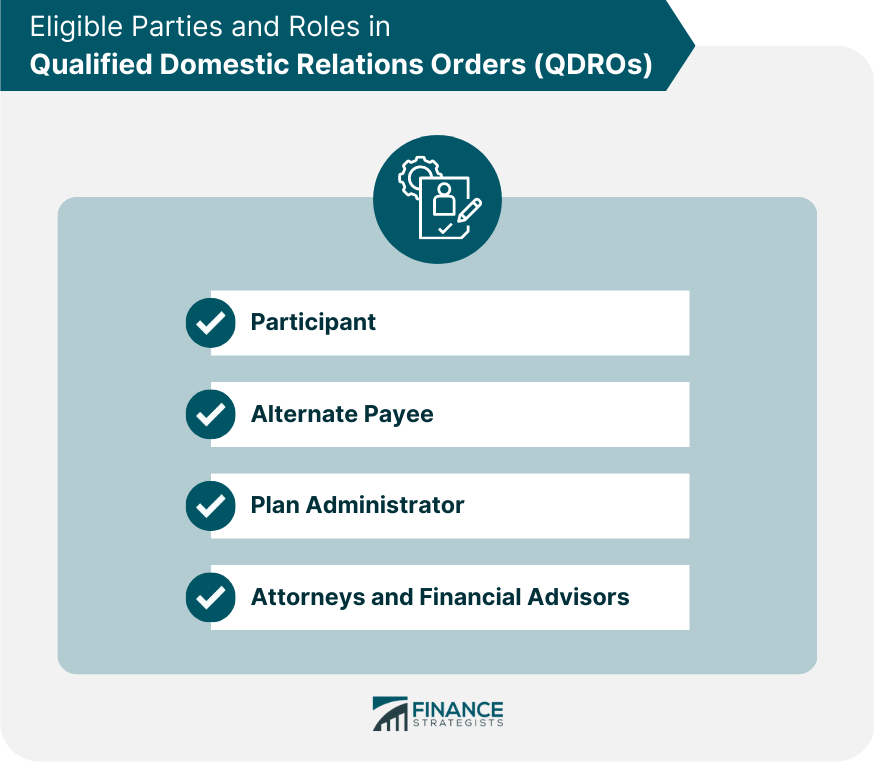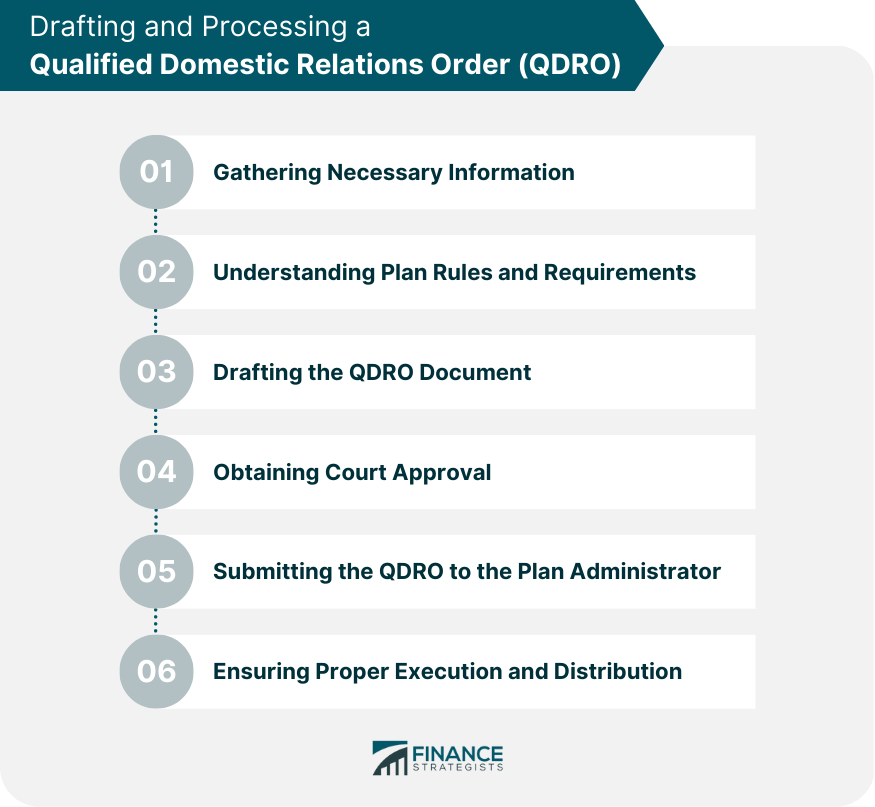A Qualified Domestic Relations Order is a court-issued order that grants an alternate payee (typically a spouse or former spouse) the right to receive a portion of the retirement benefits payable to a participant under a qualified retirement plan. QDROs serve to protect the rights of spouses and dependents in the event of a divorce or legal separation, ensuring they receive their fair share of the participant's retirement benefits. Additionally, QDROs provide a mechanism for retirement plans to legally distribute benefits to alternate payees without violating federal laws. The QDRO process involves gathering necessary information, understanding the specific retirement plan's rules, drafting the QDRO document, obtaining court approval, submitting the QDRO to the plan administrator, and ensuring proper execution and distribution of the benefits. ERISA is a federal law designed to protect the retirement assets of American workers. It sets minimum standards for pension plans in private industry and provides rules on the federal income tax effects of transactions associated with employee benefit plans. The Retirement Equity Act amended ERISA to allow for the use of QDROs, permitting retirement plans to make direct payments to alternate payees without violating the anti-alienation provisions of ERISA. State laws can impact QDROs as they govern property division in divorce proceedings, which may include retirement benefits. As such, it's essential for legal and financial professionals to understand the specific state laws that may affect QDROs. Defined benefit plans promise a specified monthly benefit at retirement, often based on a formula that considers the participant's salary and years of service. QDROs for defined benefit plans typically involve dividing the retirement benefits based on a specified formula. Defined contribution plans, such as 401(k)s and 403(b)s, allow participants to make pre-tax contributions to individual accounts. QDROs for defined contribution plans generally involve dividing the account balance between the participant and the alternate payee. IRAs are personal retirement savings vehicles that may be subject to division during a divorce. While IRAs are not governed by ERISA, they may still require a QDRO or similar court order to ensure proper division and avoid tax penalties. Non-qualified plans are not subject to ERISA and do not qualify for tax-favored treatment. These plans cannot be divided using a QDRO, but they may still be subject to division during a divorce through other legal mechanisms. The participant is the individual who participates in the retirement plan and has earned the retirement benefits. The alternate payee is typically a spouse or former spouse who is granted a portion of the participant's retirement benefits through a QDRO. The plan administrator is responsible for managing the retirement plan and ensuring that the QDRO is processed and implemented according to the plan's rules and federal regulations. Attorneys and financial advisors play a crucial role in the QDRO process, helping clients navigate the complexities of QDROs, retirement plans, and applicable laws. They also assist in drafting the QDRO and guiding clients through the necessary steps to ensure proper execution and distribution of benefits. A QDRO must be a domestic relations order, which is a judgment, decree, or order issued by a court in connection with a divorce, legal separation, or child support proceeding. A QDRO must include the name and last known mailing address of the participant and alternate payee, the name of each plan to which the order applies, the dollar amount or percentage to be paid to the alternate payee, and the number of payments or time period to which the order applies. A QDRO cannot require a plan to provide increased benefits, provide a type or form of benefit not otherwise available under the plan, or pay benefits to an alternate payee that are required to be paid to another alternate payee under a previous QDRO. Attorneys and financial advisors must gather relevant information, such as retirement plan documents, participant and alternate payee personal details, and relevant court orders or divorce decrees. Each retirement plan has its own rules and requirements for QDROs, which must be taken into account when drafting the order. Attorneys and financial advisors should review the plan's summary plan description and QDRO procedures. The QDRO document must be drafted in compliance with applicable laws and the specific retirement plan's rules. It should clearly outline the division of retirement benefits and include all necessary information as required by the plan. Once the QDRO document has been drafted, it must be submitted to the court for approval. The court will review the document to ensure it meets the requirements of a QDRO and is consistent with the divorce decree or other relevant court orders. After obtaining court approval, the QDRO must be submitted to the plan administrator for review and implementation. The plan administrator will determine if the order is a qualified domestic relations order and, if so, implement the order accordingly. Once the QDRO has been approved and implemented, attorneys and financial advisors should monitor the distribution of benefits to ensure that they are being paid according to the terms of the QDRO. The valuation date is the date on which the retirement benefits are divided between the participant and the alternate payee. The method of valuation must be agreed upon and specified in the QDRO, taking into account factors such as market fluctuations and investment gains or losses. The division of retirement assets should be consistent with the overall division of marital property in the divorce decree or other relevant court orders. QDROs should address survivor benefits, specifying whether the alternate payee is entitled to receive any survivor benefits and, if so, in what form and amount. The tax implications of a QDRO should be considered, as the division of retirement benefits can have significant tax consequences for both the participant and the alternate payee. The impact of bankruptcy on QDROs should be considered, as the treatment of retirement benefits in bankruptcy proceedings can affect the rights of the participant and the alternate payee. It is crucial to address the division of retirement benefits and the need for a QDRO during divorce negotiations, as neglecting this aspect can lead to complications and disputes later on. Providing incomplete or incorrect information in the QDRO can result in delays, additional costs, or the rejection of the order by the court or the plan administrator. Failing to follow the specific retirement plan's rules and requirements when drafting a QDRO can lead to the order being deemed non-qualified, which may result in significant delays or the need to redraft the order. Not considering the tax implications and potential penalties associated with the division of retirement benefits can lead to unexpected financial consequences for the participant and the alternate payee. QDROs play a vital role in protecting the retirement assets of both participants and alternate payees during divorce or legal separation proceedings. They ensure that retirement benefits are fairly divided and distributed according to the terms of the divorce decree or other relevant court orders. Legal and financial professionals play a critical role in the QDRO process, helping clients navigate complex laws, retirement plan rules, and tax implications. They assist in drafting QDROs, obtaining court approval, and ensuring proper execution and distribution of benefits. As laws and regulations related to retirement benefits and domestic relations continue to evolve, it is essential for legal and financial professionals to stay informed and adapt their practices accordingly. This ensures that they can provide the best possible guidance and support to their clients throughout the QDRO process.What Is a Qualified Domestic Relations Order (QDRO)?
Legal Framework and History
The Employee Retirement Income Security Act of 1974 (ERISA)
The Retirement Equity Act of 1984
State Laws and Their Impact on QDROs
Types of Retirement Plans and Their Relevance to QDROs
Defined Benefit Plans
Defined Contribution Plans
Individual Retirement Accounts (IRAs)
Non-qualified Plans
Eligible Parties and Roles in QDROs
Participant
Alternate Payee
Plan Administrator
Attorneys and Financial Advisors

QDRO Requirements
The Order Must Be a Domestic Relations Order (DRO)
Necessary Information and Specifications
Conditions for Qualification
Drafting and Processing a QDRO
Gathering Necessary Information
Understanding Plan Rules and Requirements
Drafting the QDRO Document
Obtaining Court Approval
Submitting the QDRO to the Plan Administrator
Ensuring Proper Execution and Distribution

Key Considerations for QDROs
Valuation Date and Method
Division of Assets and the Marital Property
Survivor Benefits
Tax Implications
QDROs and Bankruptcy
Common Mistakes and Pitfalls
Failing to Address QDROs During Divorce Negotiations
Inadequate or Incorrect Information
Not Following Plan Guidelines
Overlooking Tax Implications and Penalties
Conclusion
Qualified Domestic Relations Order (QDRO) FAQs
A QDRO is a legal order that divides a retirement plan between two parties as part of a divorce settlement.
A QDRO can be used for most types of retirement plans, including 401(k)s, pensions, and profit-sharing plans.
Typically, the divorce attorney or a QDRO specialist will prepare the QDRO, but the plan administrator may also provide assistance.
Yes, a QDRO can be modified if the court allows it and both parties agree to the changes. However, any changes must comply with the terms of the retirement plan.
If a QDRO is not properly executed, it may not be valid, and the retirement plan may not be divided as intended. It is important to ensure that the QDRO complies with all legal requirements and is properly executed.
True Tamplin is a published author, public speaker, CEO of UpDigital, and founder of Finance Strategists.
True is a Certified Educator in Personal Finance (CEPF®), author of The Handy Financial Ratios Guide, a member of the Society for Advancing Business Editing and Writing, contributes to his financial education site, Finance Strategists, and has spoken to various financial communities such as the CFA Institute, as well as university students like his Alma mater, Biola University, where he received a bachelor of science in business and data analytics.
To learn more about True, visit his personal website or view his author profiles on Amazon, Nasdaq and Forbes.















